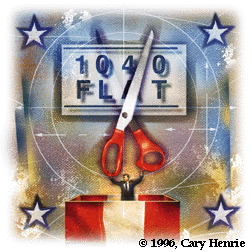


Some flat-tax gains are clear. Most businesses like the plan's simplicity, saysGoolsbee, and not just for its aesthetics. For them, compliance with thecurrent tax code costs as much as $200 billion annually. That burden is high,"particularly to small businesses," he says, "who a lot of time don't have theresources to hire tax lawyers. They end up spending one month out of 12figuring out their taxes."
Simplicity is also probably the prime attraction of a flat tax to individuals,half of whom now pay for professional help in filing their returns. Theoft-cited promise of a 12-line, "postcard-sized" form, with no additionalschedules, seems a stunning contrast to the annual 1040 nightmare.
And yet, as Elizabeth Garrett notes, 70 percent of individual filers use theone-page 1040A or 1040EZ. Other Chicago faculty agree that current taxcomplexity arises from the income base, defined by a jumble of deductions, andnot from the 1040's five progressive rates. A Democrat, Garrett muses, "Maybewhat my party should have done was put the 1040EZ on a postcard."
An international perspective supports the notion, hard as it is for Americanvoters to swallow, that the tax code isn't all bad. Among industrializedcountries, says Raaj Sah, "The U.S. system can take a place of pride as beingflatter, simpler, and better administered."
 The University of Chicago Magazine April 1996
The University of Chicago Magazine April 1996